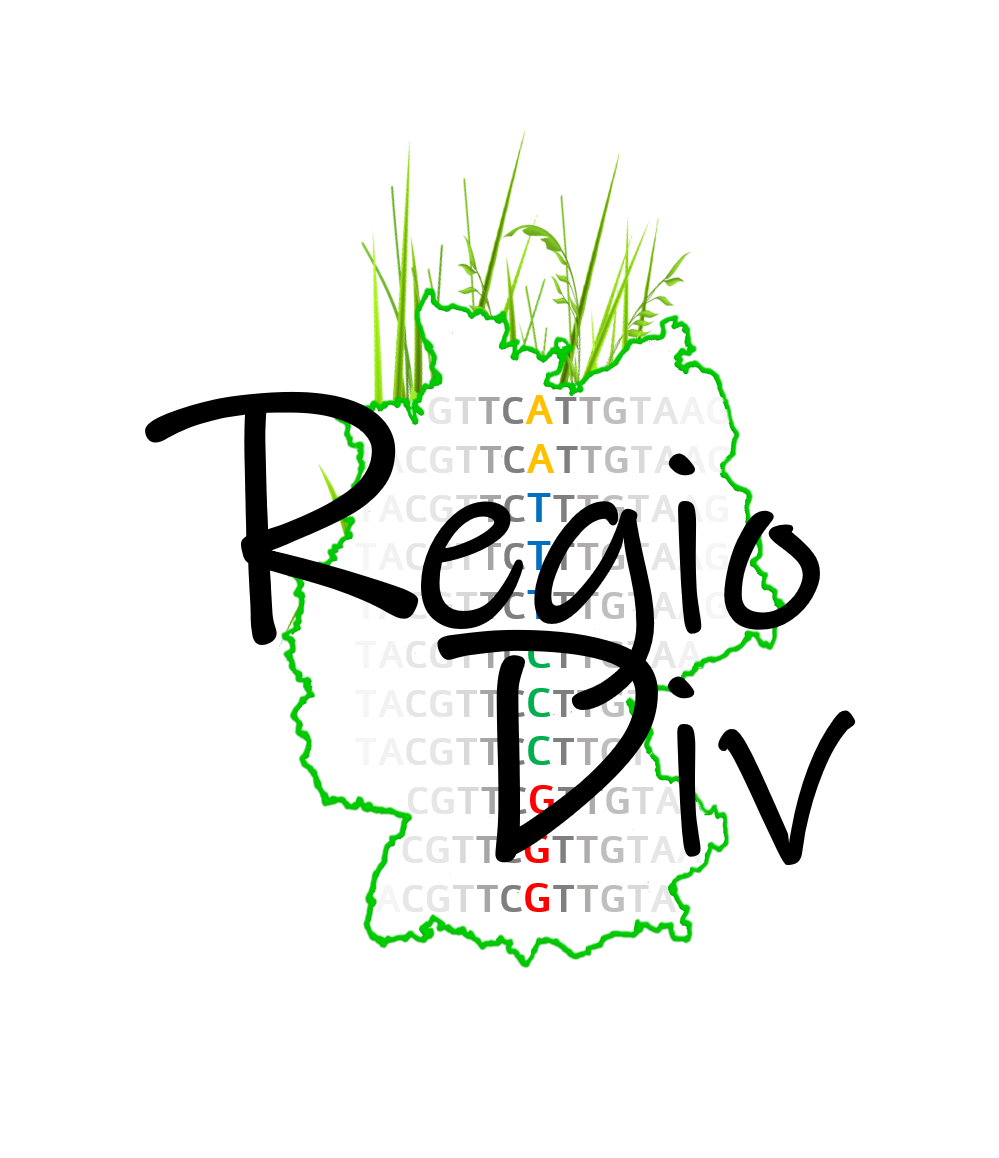RegioDiv
Genetic variation of herbaceous species in Germany
Reference number: 3520 82 06A-AW, MODUL 2, Funding: BfN, Federal Office for Nature Conservation

Background
Since 2.3.2020 the use of autochtonous material is mandatory for the putting plant materials in the free landscape according to §40 BNatSchG in Germany.
BfN 2020
. Thus the existing market of regional seed, "Regiosaatgut", has a particular responsibility.
The production of regional seed is based on a system of 22 seed transfer zones (regions of origin), which were developed by DBU project
(Prasse et al. 2010)
. This system is based on the system of ecoregions after Meynen & Schmithüsen (1953-1962) and further grouping criteria. Although general population genetic aspects were included (in particular isolation-by-distance) no empirical data on spatial genetic structure of plant species were considered, because such data were not available. To close this knowledge gap, BfN has funded the project RegioDiv from 2020-2023.
Aims
1. Build up an empirical data base of patterns of genetic variation and differentiation in >25 representative species used in grassland restoration (i.e. grasses, herbs legumes).
2. Collection of leaf material in all 22 seed transfer zones from min 3 sites.
3. Genetic analysis with genome-representative SNP markers (single nucleotide polymorphism) and analysis of population genetic structure.
4. Deduce recommendation for practical management of seed material in the context of §40 BNatSchG.
Results
in these publications:
NEW Höfner J, Kolář F, Müller CM, Oberprieler C, Šemberová K, Voltrová A, Bucharova A, Michalski SG, Durka W (2026). Managing polyploid complexity in grassland restoration: cytotype differentiation and implications for seed zones. Journal of Applied Ecology, 63: e70278. pdf doi: 10.1111/1365-2664.70278
NEW Höfner J, Bucharova A, Durka W, Michalski SG. (2025). Spatial patterns of genomic variation and genomic offset in a common grassland plant and their relation to seed transfer zones. Ecology and Evolution, 15: e72152. pdf doi: 10.1002/ece3.72152
Durka W, Michalski SG, Höfner J, RegioDiv Konsortium (2024) RegioDiv — Genetische Vielfalt krautiger Pflanzenarten in Deutschland und Empfehlungen für die Regiosaatgut-Praxis. BfN Schriften, 687, 1-315. pdf (59MB) DOI: 10.19217/skr687
Correction to BfN Schriften 687 concerning Achillea pratensis Errata zu BfN Schriften 687.pdf
Durka W, Michalski SG, Höfner J, Bucharova A, Kolář F, Müller CM, Oberprieler C, Šemberová K, Bauer M, Bernt M, Bleeker W, Brändel S, Bucher SF, Eibes PM, Ewald M, Goldberg R, Grant K, Haider S, Harpke A, Haun F, Kaufmann R, Korell L, Kunzmann D, Lauterbach D, Leib S, Lenzewski N, Loritz H, Madaj A-M, Mainz AK, Meinecke P, Mertens H, Meyer MH, Musche M, Ristow M, Rosche C, Roscher C, Rutte D, Schacherer A, Schmidt W, Schmoldt J, Schneider S, Schwarz J-H, Skowronek S, Socher SA, Stanik N, Twerski A, Weiß K, Weiß M, Wille A, Zehm A, Zidorn C, RegioDiv-Consortium (2025) Assessment of genetic diversity among seed transfer zones for multiple grassland plant species across Germany. Basic and Applied Ecology, 84: 50-60. pdf DOI: 10.1016/j.baae.2024.11.004
Durka W, Michalski SG, Höfner J, Kolář F, Müller CM, Oberprieler C, Šemberová K und das RegioDiv Konsortium (2024) RegioDiv — Genetische Vielfalt krautiger Pflanzenarten in Deutschland: Zusammenfassung und Empfehlungen für die Regiosaatgut-Praxis. Natur und Landschaft, 99, 322-332. pdf DOI: 10.19217/NuL2024-07-02
Durka W, Michalski SG, Höfner J und das RegioDiv-Konsortium. (2024). Wissenschaftlicher Ausblick: Das RegioDiv-Projekt, genetische Vielfalt von Wildpflanzen in Deutschland. In: Landwirtschaftliches Technologiezentrum Augustenberg (LTZ) (Hrsg.), Gebietseigenes Wildpflanzensaatgut - Praktische Informationen zur Vermehrung, (pp. 27-28). Karlsruhe. pdf Augustenberger Beratungshilfe Gebietseigenes Wildpflanzensaatgut.pdf
Durka W, Michalski SG, Buchavora A, Höfner J, RegioDiv-Konsortium. (2024). Das RegioDiv-Projekt: Genetische Vielfalt krautiger Pflanzenarten in Deutschland. In: NaturGarten_e.V. (Ed.), Natur & Garten Tagungsband Symposium Geisenheim 2023 - § 40 des Bundesnaturschutzgesetzes im Spannungsfeld von Biodiversität und Botanischem Artenschutz (pp. 6-9). Bonn. Tagungsband online

